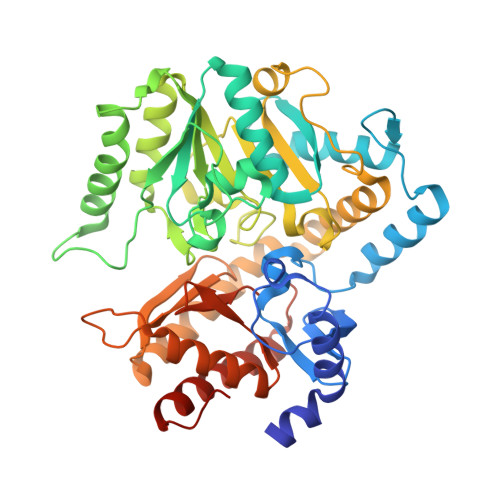Crystal structure of the novel amino-acid racemase isoleucine 2-epimerase from Lactobacillus buchneri.
Hayashi, J., Mutaguchi, Y., Minemura, Y., Nakagawa, N., Yoneda, K., Ohmori, T., Ohshima, T., Sakuraba, H.(2017) Acta Crystallogr D Struct Biol 73: 428-437
- PubMed: 28471367
- DOI: https://doi.org/10.1107/S2059798317005332
- Primary Citation of Related Structures:
4YSN, 4YSV, 5WYA, 5WYF - PubMed Abstract:
Crystal structures of Lactobacillus buchneri isoleucine 2-epimerase, a novel branched-chain amino-acid racemase, were determined for the enzyme in the apo form, in complex with pyridoxal 5'-phosphate (PLP), in complex with N-(5'-phosphopyridoxyl)-L-isoleucine (PLP-L-Ile) and in complex with N-(5'-phosphopyridoxyl)-D-allo-isoleucine (PLP-D-allo-Ile) at resolutions of 2.77, 1.94, 2.65 and 2.12 Å, respectively. The enzyme assembled as a tetramer, with each subunit being composed of N-terminal, C-terminal and large PLP-binding domains. The active-site cavity in the apo structure was much more solvent-accessible than that in the PLP-bound structure. This indicates that a marked structural change occurs around the active site upon binding of PLP that provides a solvent-inaccessible environment for the enzymatic reaction. The main-chain coordinates of the L. buchneri isoleucine 2-epimerase monomer showed a notable similarity to those of α-amino-ℇ-caprolactam racemase from Achromobactor obae and γ-aminobutyrate aminotransferase from Escherichia coli. However, the amino-acid residues involved in substrate binding in those two enzymes are only partially conserved in L. buchneri isoleucine 2-epimerase, which may account for the differences in substrate recognition by the three enzymes. The structures bound with reaction-intermediate analogues (PLP-L-Ile and PLP-D-allo-Ile) and site-directed mutagenesis suggest that L-isoleucine epimerization proceeds through abstraction of the α-hydrogen of the substrate by Lys280, while Asp222 serves as the catalytic residue adding an α-hydrogen to the quinonoid intermediate to form D-allo-isoleucine.
- Department of Applied Biological Science, Faculty of Agriculture, Kagawa University, 2393 Ikenobe, Miki-cho, Kita-gun, Kagawa 761-0795, Japan.
Organizational Affiliation:

















